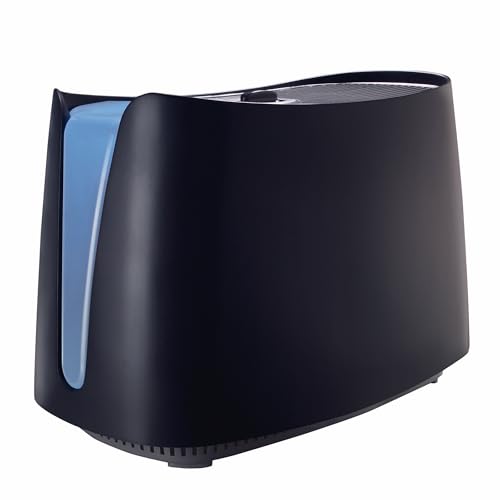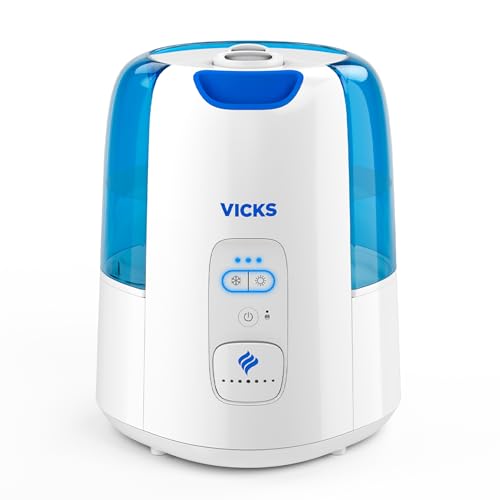Disclosure
This website is a participant in the Amazon Services LLC Associates Program, an affiliate advertising program designed to provide a means for us to earn fees by linking to Amazon.com and affiliated sites.
Using a humidifier in your bedroom can significantly improve your sleep quality, skin hydration, and overall respiratory health. In fact, many people are surprised at how much of a difference balanced indoor humidity makes—especially at night when our bodies are at their most vulnerable.
Have you ever woken up with a dry throat, cracked lips, or a stuffy nose? That might be your indoor air telling you it’s too dry. Many modern homes, especially during colder months or in air-conditioned environments, have low humidity levels that lead to discomfort and even health issues. A humidifier helps restore moisture in the air, creating a more comfortable and supportive sleep environment.
Best Humidifiers for Bedroom Comfort
When it comes to enhancing your sleep environment, not all humidifiers are created equal. The best bedroom humidifiers are quiet, efficient, and easy to clean. Here are three top-rated options that stand out for bedroom use:
1. Levoit Classic 300S Smart Ultrasonic Cool Mist Humidifier
- 𝙀𝙛𝙛𝙤𝙧𝙩𝙡𝙚𝙨𝙨 𝘾𝙤𝙢𝙛𝙤𝙧𝙩…
- 𝙋𝙤𝙬𝙚𝙧𝙛𝙪𝙡 𝙖𝙣𝙙…
- 𝙈𝙪𝙡𝙩𝙞-𝙍𝙤𝙡𝙚 𝙎𝙪𝙞𝙩𝙖𝙗𝙡𝙚…
Why we picked it:
The Levoit Classic 300S offers ultra-quiet operation, smart features, and a large 6L tank, making it ideal for overnight use in bedrooms.
2. Honeywell HCM-350 Germ-Free Cool Mist Humidifier
- Humidifier for bedroom: As the ideal baby humidifier, this device has a soft,…
- Use with Honeywell filters – For best performance with these cool mist…
- Cleaner invisible moisture: this Honeywell cool air humidifier effectively…
Why we picked it:
This model uses UV technology to kill up to 99.9% of bacteria in water, making it a great choice for allergy sufferers and those with respiratory sensitivities.
3. Vicks Warm Mist Humidifier
- Cool and Warm Mist for Year-round comfort – Both mist temperatures can provide…
- Choose your Mist Temperature – Warm and cool mist humidifiers for home provide…
- Cough and Congestion Relief – Humidifiers help ensure proper humidity levels,…
Why we picked it:
Perfect for cold and flu season, this warm mist humidifier produces soothing steam and includes a medicine cup for inhalants like Vicks VapoSteam.
Improved Sleep Quality and Comfort
A key benefit of using a humidifier in your bedroom is the improvement in sleep quality and overall comfort. Dry air can irritate your respiratory system, leading to symptoms like a dry throat, nasal congestion, or coughing, which often disrupt sleep. By adding moisture to the air, a humidifier helps keep your airways lubricated, making breathing easier and reducing nighttime awakenings.
When the air is too dry, your body loses moisture through your skin and respiratory tract, causing dehydration that can leave you feeling tired and unrested in the morning. Humidifiers help maintain optimal humidity levels—typically between 40% and 60%—which prevents dryness without making the room feel damp or stuffy.
Moreover, a well-humidified bedroom creates a soothing environment, which can reduce snoring caused by dry air irritating the throat. People with sleep apnea or asthma may also find relief as moist air helps keep their airways open and reduces inflammation.
Skin Health and Hydration
Dry indoor air can take a toll on your skin, especially overnight when your skin naturally loses moisture as it repairs itself. Using a humidifier in your bedroom helps maintain optimal humidity levels that keep your skin hydrated, soft, and healthy.
Here’s how a humidifier benefits your skin:
- Prevents Dryness and Flaking: When air lacks moisture, your skin can become dry, flaky, and itchy. A humidifier replenishes lost moisture, reducing these uncomfortable symptoms.
- Reduces Irritation: Dry air can exacerbate skin conditions like eczema, psoriasis, or rosacea. Proper humidity helps soothe inflammation and decrease redness.
- Slows Premature Aging: Consistently dry skin can lead to fine lines and wrinkles. Hydrated skin is more elastic and youthful-looking, which humidifiers support by maintaining moisture balance.
- Protects Lip Health: Cracked and chapped lips are a common side effect of dry air. Using a humidifier prevents this by keeping the skin on your lips moisturized throughout the night.
- Enhances Absorption of Skincare Products: When skin is well-hydrated, moisturizers and treatments applied before bed work more effectively.
Respiratory Health and Allergy Relief
Using a humidifier in your bedroom can make a significant difference if you suffer from respiratory issues or allergies. Dry air often worsens symptoms like congestion, coughing, and irritation, making it harder to breathe comfortably at night. Humidifiers add moisture to the air, which helps soothe and protect your respiratory system.
Key respiratory benefits include:
- Eases Nasal Congestion: Moist air helps thin mucus, making it easier to clear your nasal passages and reducing stuffiness.
- Reduces Dry Cough and Throat Irritation: Dry air can cause a scratchy throat and persistent coughing. Adding humidity helps soothe these symptoms.
- Improves Sinus Health: Proper humidity keeps your sinuses moist, lowering the risk of sinus infections and nosebleeds caused by dryness.
- Alleviates Allergy Symptoms: Dust, pollen, and pet dander can irritate dry nasal passages. Moist air reduces this irritation and inflammation.
- Supports Asthma Management: Humidified air can prevent airway dryness and inflammation, helping some people with asthma breathe more easily.
Protecting Furniture and Home Environment
A humidifier doesn’t just benefit your health—it also helps preserve your bedroom environment, including your furniture, flooring, and even houseplants. Dry air can cause damage over time, especially in climates with low humidity or during winter when heating systems dry out indoor air.
Here’s how maintaining proper humidity with a humidifier protects your home:
- Prevents Wood Cracking and Warping: Dry air can cause wooden furniture, floors, and musical instruments to shrink, crack, or warp. Balanced humidity helps keep these items stable and prolongs their lifespan.
- Reduces Static Electricity: Low humidity increases static buildup, which can damage electronics and cause discomfort. Adding moisture reduces static shocks.
- Supports Houseplants: Many common indoor plants thrive in humid environments. A humidifier can keep plants healthy by preventing leaf drying and browning.
- Minimizes Dust Accumulation: Moist air helps dust particles settle faster, reducing the amount of airborne dust that settles on surfaces and in your breathing space.
- Protects Wallpaper and Paint: Dry air can cause wallpaper edges to peel and paint to crack. Maintaining proper humidity helps preserve your room’s aesthetic.
How to Use a Humidifier Safely and Effectively
To enjoy all the benefits of a humidifier without drawbacks, it’s essential to use and maintain it properly. Incorrect use can lead to problems like mold growth, bacteria buildup, or excessive humidity.
Here are key tips to use your bedroom humidifier safely and effectively:
- Maintain Optimal Humidity Levels: Keep indoor humidity between 40% and 60%. Use a hygrometer to monitor levels and avoid over-humidifying, which can encourage mold and dust mites.
- Clean Regularly: Clean your humidifier every 3 days to 1 week depending on usage. Use vinegar or manufacturer-recommended cleaning agents to prevent mold, bacteria, and mineral buildup.
- Use Distilled or Filtered Water: Tap water contains minerals that can disperse into the air as white dust. Using distilled water reduces this problem and prolongs the device’s life.
- Place Properly: Position your humidifier at least a few feet from your bed and away from walls or electronics to avoid moisture damage.
- Turn Off When Not Needed: If you leave your home for extended periods or if humidity is naturally high, turn off the humidifier to prevent excess moisture.
- Follow Manufacturer Instructions: Each humidifier model may have specific usage and maintenance guidelines. Following these ensures safety and performance.
Conclusion
Using a humidifier in your bedroom offers a wide range of benefits that enhance your health, comfort, and home environment. By maintaining balanced humidity levels, you can:
- Improve sleep quality and reduce nighttime discomfort
- Keep your skin hydrated and healthy
- Support respiratory health and reduce allergy symptoms
- Protect your furniture, flooring, and houseplants
- Ensure safe and effective use by following maintenance tips
Frequently Asked Questions About Using a Humidifier in Your Bedroom
How often should I run my bedroom humidifier?
- Ideally, run your humidifier throughout the night to maintain consistent humidity.
- Monitor humidity levels and adjust usage to keep them between 40%-60%.
- Turn off the humidifier if you leave the room or if the air feels damp.
Can a humidifier help with allergies and asthma?
- Yes, by keeping airways moist, humidifiers can reduce irritation from allergens like dust and pollen.
- However, maintaining proper humidity and cleaning the device regularly is crucial to avoid mold or bacteria buildup that can worsen symptoms.
What type of water should I use in my humidifier?
- Distilled or filtered water is best to prevent mineral deposits and white dust.
- Tap water can contain minerals that may spread into the air or damage the humidifier over time.
Are warm mist or cool mist humidifiers better for the bedroom?
- Cool mist humidifiers are generally safer for bedrooms, especially around children, and use less electricity.
- Warm mist models can help during colds by producing soothing steam but require careful placement to avoid burns.
How do I clean my humidifier properly?
- Clean your humidifier every 3-7 days depending on use.
- Use a mixture of vinegar and water or manufacturer-recommended cleaners to disinfect and remove mineral buildup.
- Empty and dry the tank daily to prevent mold growth.
Can I over-humidify my bedroom?
- Yes, excess humidity can encourage mold, dust mites, and bacteria growth.
- Use a hygrometer to monitor levels and keep humidity between 40%-60% for optimal health and comfort.



